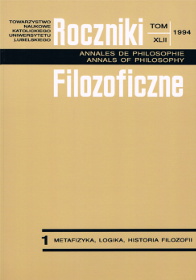A Controversy on the Role of Wolffianism in the Polish Enlightenment. Antoni Wiśniewski S.P. and Christian Wolff
Abstract
The paper seeks to verify the sources of a thesis which emphasizes the impact of Ch. Wolff on the Polish reforms of teaching philosophy in the Catholic education in the first half of the 18th century. The paper compares also the works by A. Wis´niewski S.P. with those written by Wolff and takes into account the fact that the Piarist was a pioneer in formulating the didactic curriculum in Piarist education. It contains a comparative analysis carried out against the background of influential Western handbooks (written by, e.g., E. Pourchot, E. Corsini, A. Genovesi, F. Jacquier, J. Redlhammer, J.A. Nollet). This analysis allowed us to state that Wis´niewski was original in his grasp of the subject matter. He freely took advantage of varied philosophical and scientific traditions, as well as particular handbooks (very often other handbooks than Wolff’s). The differences between the authors in question have been revealed both as regards philosophical declarations and in the structural dimension and contents. Wis´niewski’s solution differs, first of all, in view of its consequent eclectism which diverges from Wolff’s systemic interpretation. The latter solution is, however, diluted with a (parallel) three-level (empirical, mathematical and philosophical) analyses of reality. It is also in view of the conditionings of the then philosophy (e.g. the debates on the philosophy of life) that the Piarist’s standpoint diverges from the rationalistic and naturalistic solutions which we find in Wolff. The Polish Piarist founded the ideal of “Christian philosophy”. This ideal while showing similarities between the contents and methods of argumentation and the philosophy of the Enlightenment, conditions a close tie with the 18th-century philosophical and theological formation, defined as the so-called Christian Enlightenment.
Copyright (c) 1994 Roczniki Filozoficzne

This work is licensed under a Creative Commons Attribution-NonCommercial-NoDerivatives 4.0 International License.





